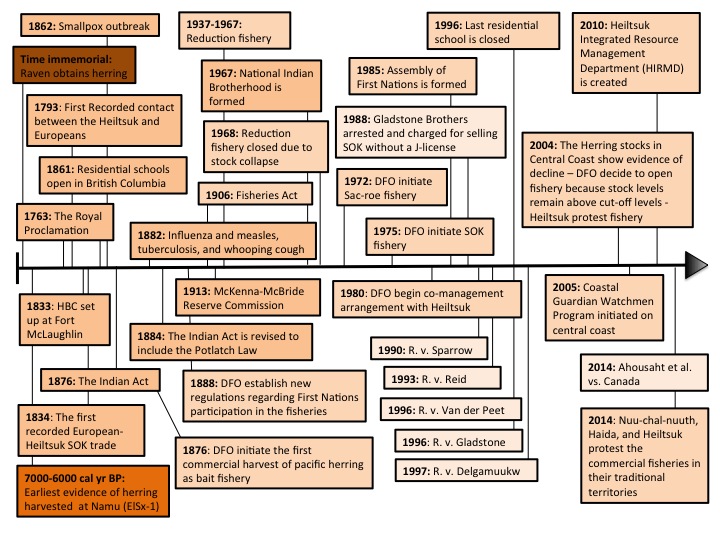Fish-WIKS News
» Go to news mainHerring Research in BC
Fish-WIKS B.C. Masters Student, Alisha Gauvreau, has created a poster [PDF 1.5 MB] for her Masters research, titled: “Everything revolves around the herring”: Continuity and Transformation of the Heiltsuk Herring Fishery Through Time.” She has shared the results of her investigations at two conferences this fall and is busy preparing additional materials for community meetings with the Tla-o-qui-aht in the New Year. Alisha also created a timeline outlining milestone events. 
Abstract: Pacific herring (Clupea pallasii), a cultural keystone species, are a critical part of the social-ecological systems on the central coast of British Columbia. For millennia, the Heiltsuk First Nation have depended on this forage fish for food, social, ceremonial, and economic purposes. My research, nested within the coast-wide “Herring School” initiative, documents and analyzes the components of the Heiltsuk First Nation traditional management system for Pacific herring, and how they have changed over time. Through a series of 25 formal and informal interviews with key community informants, and participation in DFO-Gladstone reconciliation meetings and Integrated Herring Harvesting Planning Committee meetings I’ve identified: (1) How traditional social institutions, local ecological knowledge, and aspects of Heiltsuk worldview informed herring management strategies in the past, (2) and how changes in state-led herring management in BC have impacted the role of local knowledge/strategies today. I apply Berkes (2009) nested “knowledge-practice-belief” framework to structure my discussion and analysis of this data.
On October 24th 2014, I was able to share my poster at the Hakai Research Exchange held at the Mary Winspear Center in Sidney, BC. This was the third annual event, and it was a wonderful opportunity for community members from the central coast, First Nation research partners, Hakai scholars and professors, to share the exciting results of their collaborative research over the last year. The conference consisted of a series of lightning talks and a poster session. Approximately 200 people attended the event, spanning a range of disciplines from archeology and geomorphology to oceanography, ecology, conservation, and even environmental law. In the age of declining government investment in research, Hakai, like Fish-WIKS, is helping to breathe life into the research community and the many local and First Nations communities they partner with.
On December 2nd, 2014 I presented my poster at an academic conference hosted by SFU Faculty of the Environment titled “Breaking the Ice”. The event began with a series of lightning talks from professors from a variety of disciplines covering a range of topics related to climate change. The lightning talks were followed with a student poster session held at SFU museum of Archaeology and Ethnology. Dr. Dana Lepofsky, Fish-WIKS steering committee member, presented the work of “The Clam Garden Network: Cross-Disciplinary and Cross-Community Explorations into Traditional Mariculture on the Northwest Coast”. The Clam Garden Network is a research collective focused on documenting ancient mariculture practices and situating these practices within current contexts. Working with several Coastal First Nations communities, they combine ecological experiments and archaeological survey and excavations with traditional ecological knowledge. They focus their research on “clam gardens” — intertidal rock-walled terraces built to increase clam productivity.
Recent News
- Muiwatmnej Etuaptmumk Conference 2023 LiveStream
- Knowledge Pluralism in First Nations’ Salmon Management
- Learning Lodge on Mi’kmaw Livelihood Rights
- RoseAnne Archibald elected as national chief of Assembly of First Nations
- Mary Simon named as Canada’s first Indigenous governor general
- Mi'kmaw‑Led Conservation Webinar Series ‑ Thurs March 25 at 6 pm
- FishWIKS team members Lydia Ross and Lucia Fanning publish paper on informed management decision‑making
- FishWIKS team member Nicole LaTulippe co‑authors paper on need to make way for Indigenous research leadership
